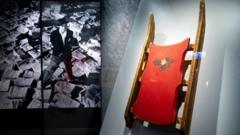One of the world's first calculating machines will not go to auction as scheduled after a Paris court provisionally blocked the historic item from export. Auction house Christie's has confirmed it will not proceed with a bid for the machine La Pascaline, developed by French mathematician Blaise Pascal in 1642.
Valuations suggested the machine could fetch €2 to 3 million (£1.77 million to £2.65 million). Christie's called it the most important scientific instrument ever offered at auction. Scientists and researchers appealed for heritage protections, arguing the instrument should be classified as a national treasure.
Pascal was just 19 years old when he developed this early version of a calculator, and only nine of these machines exist today. Official descriptions highlight it as the first attempt in history to substitute the human mind with a machine, and as marking a quantum leap in technological advancement.
The machine was recently exhibited at Christie's locations in New York and Hong Kong and was part of a sale including other notable works, such as Pascal's philosophical piece Pensées and the first printed version of Pascal's wager.
A Paris administrative court has temporarily blocked an export authorization granted by France's culture minister in May. Two experts, including one from the Louvre Museum, had previously endorsed the authorization. However, the court noted serious doubts over its legality.
Christie's has suspended the sale of La Pascaline in accordance with this provisional court ruling. The court emphasized the machine's historic and scientific worth might qualify it as a national treasure, thus offering it protections under France's heritage code. The French heritage group, Association Sites & Monuments, welcomed the decision.

















